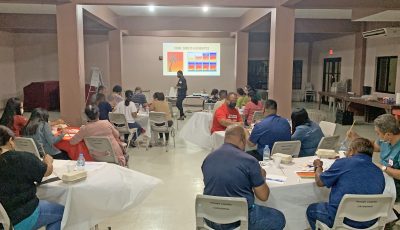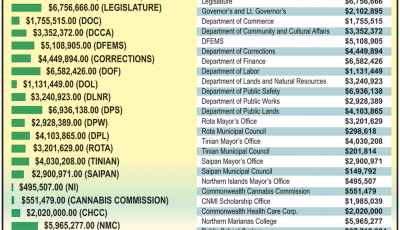CNMI drug court now has 23 participants so far
Only 1 terminated

Superior Court Associate Judge Teresa Kim-Tenorio, fourth from right, and Superior Court Drug Court coordinator TaAnn T. Kabua, at Kim-Tenorio’s right, pose with other members of the drug court. (Contributed Photo)
From the original eight, the CNMI Superior Court Drug Court now has 23 participants, with only one being terminated since its first session started on Dec. 22, 2016.
In response to Saipan Tribune’s inquiry, Superior Court Drug Court coordinator TaAnn T. Kabua said that, in order for a participant to graduate from the program, he or she must maintain sobriety and fulfill program conditions without any violation within 18 months.
So far, one participant has been dismissed for failure to meet the program’s conditions, Kabua said.
The drug court expects the first eight participants to make it until the first graduation in July 2018. It already has had 31 hearings. Associate Judge Teresa Kim-Tenorio has been presiding over the sessions.
The parties at the sessions are drug court staff such as the manager, caseworkers, and compliance specialist, and representatives of the Office of the Attorney General, the Office of the Public Defender, Department of Public Safety, Department of Corrections, Commonwealth Healthcare Corp., Community Guidance Center, and designated treatment providers from the Marianas Behavioral Health International Inc.
Kabua is inviting human services agencies and other stakeholders to join them in their efforts to help individuals struggling with substance abuse.
“The success of the drug court program is dependent on the collaborative efforts of stakeholders throughout our community,” Kabua said.
In addition to agency stakeholders, she said the success of the program also correlates with external support factors such as support from non-government organizations and families of the participants.
“We want to recognize everyone who has contributed to the successful implementation of the drug court and for their continued support of our goals and objectives,” Kabua said.
The federal court has a separate drug court program called the Drug Offender Re-entry Program of the U.S. District Court for the NMI. Of the six DORE participants, three of them have already been terminated for continued drug use and other violations.


























